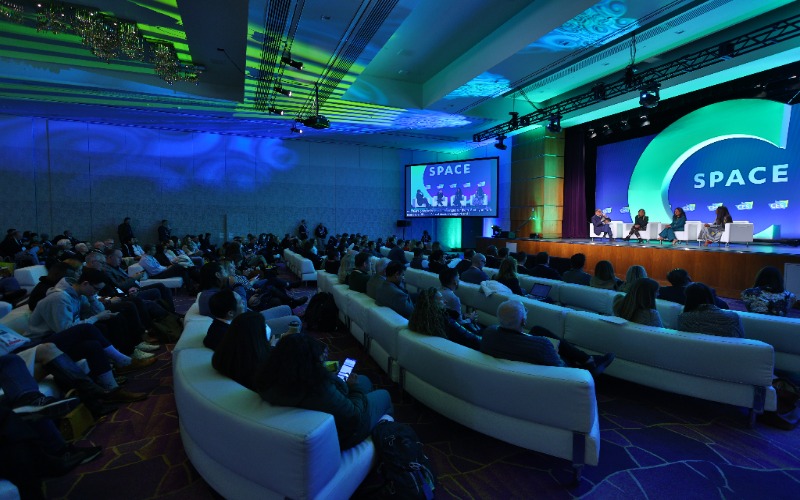CES, the world’s most influential tech event since 1967, was back with a bang last week in Las Vegas, Nevada. The event centered around the theme of “ALL ON” – one that proved to be a great way to kick start what is truly a pivotal year for tech and consumers. Indeed, every major brand and company from tech (except Apple!) came to preview the future. With a global audience (exhibitors from more than 133 countries and over 200,000 attendees), there is no other global concentration of tech know-how like it.
The show has long been more than just a consumer electronics show. It is now one of the world’s foremost automotive and mobility shows, the center for health tech innovation, the investor scouting ground for start-ups and tech to scale, and the meeting point where every business and brand is a tech business and brand. For brands, CES is the foremost showcase for products, services, business models, and innovative experiences. And it is where the latest models and releases enjoy their debuts.
This year, unsurprisingly, AI was the overarching narrative. Generative AI specifically fuelled many discussions. The largest takeout was that rather than being something to fear, AI should be embraced. Yes, it will replace some jobs, like any new and improved technology. But more importantly, it will augment and amplify our ability to work better and smarter. It will relieve us of the tedious and accelerate our ability to think, dream, and implement faster. AI has been used for several years as it enables deep thinking and connections between data and intelligent computation. But in 2024, we will see actual results as it is used more widely by consumers and industries through products, services, and experiences.
For example, in one statistic cited by Walmart, 80% of all consumer service interactions are now handled by AI-fuelled chatbots and e-chat. It became clear that after-sales service and consumer experience will be almost completely handled by LLM algorithms that support more efficient, effective, personalized, and immediate results. If brands present the experience with transparency, data protection, and accountability – consumers are happy to interact with automated query-response and service.
Looking at brand attendance more generally, the anchor of CES has always been consumer technology. So, it was unsurprising that brands including Google, LG, Samsung, Sony, Hisense, and Siemens had a highly visible presence and footprint of exhibits. Apple has never made a direct presence at CES, yet it cast an influential shadow over the many sectors and industry innovations present. Meanwhile, Microsoft seemed omnipresent and involved in partnerships with many leading brands to reshape the business. Amazon was also at the forefront of logistics, translating into a formidable presence across areas from mobility and supply chain management to consumer smart homes and living.
This year, L’Oreal was the first beauty brand to keynote at CES and brought a compelling perspective to how tech and beauty intersect to be more sustainable and inclusive. Siemens’ keynote on the industrial metaverse discusses how AI is now accessible to all through its partnership with Microsoft and accessible code applications. Hyundai premiered how AI and autonomous robotics have progressed to transform how we build things on an industrial scale, looking in particular at heavy construction and mining. Microsoft debuted with Samsung how an AI key will be added to the core functionality of laptops and phones to demonstrate how consumers can now use AI to augment and improve content creation. Microsoft’s CEO Satya Nadella was on stage with Walmart (which had a big exhibition space showing the future of retail) to illustrate how collaboration and partnership yield direct and seamless shopping experiences for consumers and workforce associates.
The real story from 2024’s CES was how advanced connectivity provided by next-generation data/cloud and micro-processing has combined with increased computing capabilities and powerful chips to fuel AI and immersive experiences, tapping into real-time data analytics. And how edge and sensor technology provides real-life data that’s unmatched against digital twin data sets and harnessed to pinpoint predictive machine learning for personalization. When applied to SMART devices, homes, and cities, this level of interaction and interconnectivity opens a whole new world of possibility.
This will be the era when connectivity for B2B on an industrial scale takes hold. In addition, it’s expected that B2S (Business to Society) will begin to adapt and implement technology solutions for addressing issues such as pollution, climate change, sustainability, disaster prevention and relief, global food demands, social impact issues, and greater international collaboration.
CES identified that AI and sustainability are on the minds of the biggest organizations and brands in the world – considered when investments are made, partnerships determined, and experiences created. It mirrored Interbrand’s Arena thinking that the best companies are no longer category or sector-specific, and brands must instead look to address consumer needs and how they live their lives. One booth display from Siemens reflected this thinking– showing that brand strategy today transcends categories or products and elevates and focuses on the value, experience, and solutions consumers and businesses want because of technology. At CES 2024, the barriers to opportunity were brought down. It was clear that tech enables new ways of working, learning, doing, and selling.











